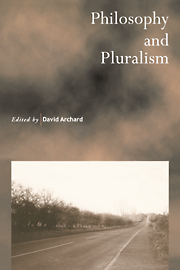Book contents
- Frontmatter
- Contents
- Notes on Contributors
- Introduction
- Philosophy in Different Cultural Contexts
- A Case for Philosophical Pluralism: The Problem of Intentionality
- William James, ‘A Certain Blindness’ and an Uncertain Pluralism
- Cultural Realism: the ancient philosophical background
- Religion and Pluralism
- A Single True Morality? The Challenge of Relativism
- Pluralism, Realism and Truth
- Value-Pluralism
- Moral Philosophy and its Anti-pluralist Bias
- Coping with the Many-Coloured Dome: Pluralism and Practical Reason
- Rawlsians, Pluralists, and Cosmopolitans
- Political Liberalism, Secular Republicanism: two answers to the challenges of pluralism
- ‘Race’ in Britain and the Politics of Difference
- Tragedy, Moral Conflict, and Liberalism
- References
Philosophy in Different Cultural Contexts
Published online by Cambridge University Press: 30 October 2009
- Frontmatter
- Contents
- Notes on Contributors
- Introduction
- Philosophy in Different Cultural Contexts
- A Case for Philosophical Pluralism: The Problem of Intentionality
- William James, ‘A Certain Blindness’ and an Uncertain Pluralism
- Cultural Realism: the ancient philosophical background
- Religion and Pluralism
- A Single True Morality? The Challenge of Relativism
- Pluralism, Realism and Truth
- Value-Pluralism
- Moral Philosophy and its Anti-pluralist Bias
- Coping with the Many-Coloured Dome: Pluralism and Practical Reason
- Rawlsians, Pluralists, and Cosmopolitans
- Political Liberalism, Secular Republicanism: two answers to the challenges of pluralism
- ‘Race’ in Britain and the Politics of Difference
- Tragedy, Moral Conflict, and Liberalism
- References
Summary
The question to which I seek here to address myself may be formulated in the following way. Is philosophy to be thought of as essentially one and the same subject in all its different manifestations, carried on, certainly, in noticeably differing ways by different people at different times and in different places, but to be understood nevertheless as consisting of one overall body of knowledge? Or should the term ‘philosophy’ be regarded rather as standing for a ‘family resemblance concept’, and the family in question as containing among its members some who may be hardly capable of establishing any mutually agreed channels of communication with each other? In what follows I shall try to display, if not necessarily to disentangle, some of the underlying complexities on which, as it seems to me, answers to these questions may depend.
Geographically or culturally based distinguishing labels are, of course, in common use in philosophy. Greek philosophy, German philosophy, American philosophy, Oxford philosophy, ‘Continental’, Indian, Chinese, Bulgarian, Jewish, Québecois, Nova Scotian, Islamic, Parisian, London, Belfast, Dublin, Coleraine philosophy. … Where, if anywhere, has my list started to take on an arbitrary implausibility of its own? Again no-one finds it in the least strange to talk, for example, of Ancient, Medieval, eighteenth century or twentieth century philosophy. But are these ways of picking out particular tracts of philosophy in principle any different from such references as one may make to Hume's or Russell's philosophy or to that of the ‘first’ or ‘second’ Wittgenstein?
- Type
- Chapter
- Information
- Philosophy and Pluralism , pp. 7 - 18Publisher: Cambridge University PressPrint publication year: 1996

